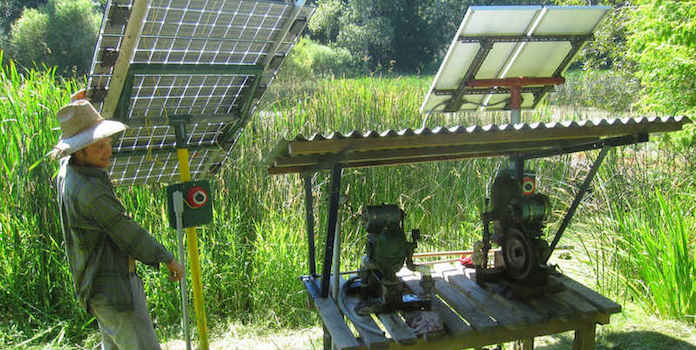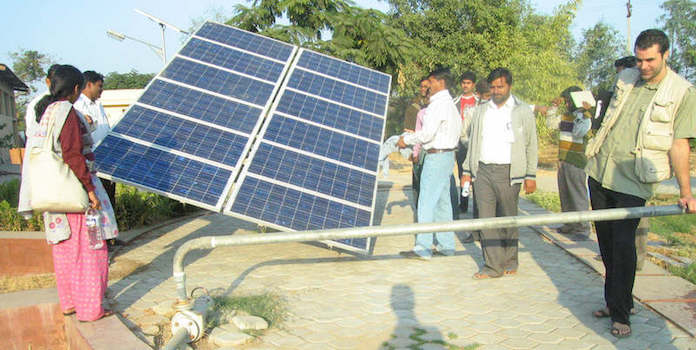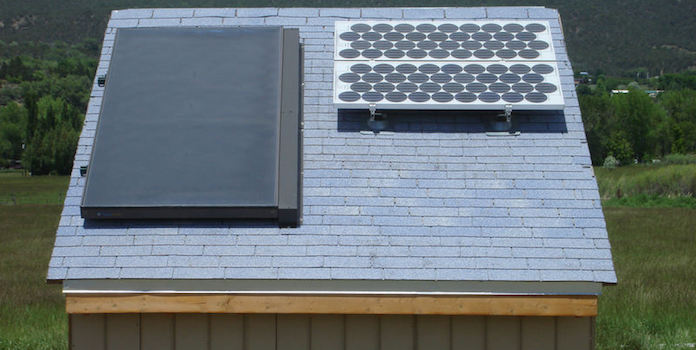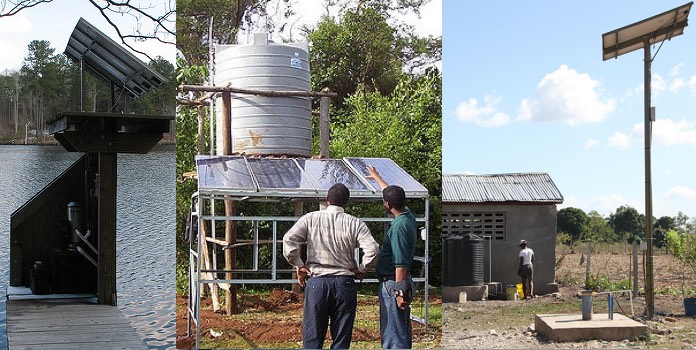Solar Water Pumps: Versatile Wonders
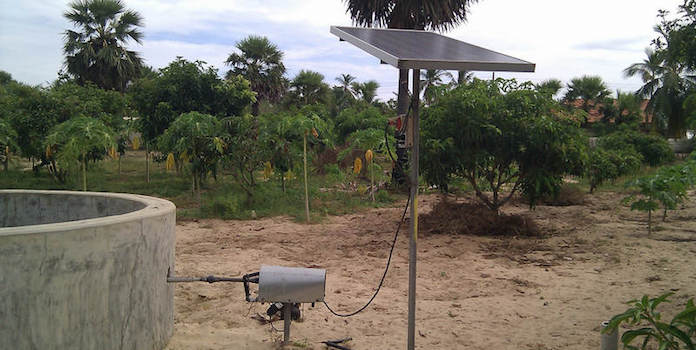
Solar water pumps are cost-effective and have multiple uses.
Solar power is quickly becoming an affordable way to reduce energy costs. A novel way of saving money through solar power is the use of solar powered water pumps. Using a pump powered by the sun is a great way to provide water in places where conventional electricity is not an option, but what are they and why are they so great? Read on and we’ll explain!
Although water pumps powered by solar panels typically do not move water in large volumes like their conventional, fossil fuel-powered counterparts, solar pumps are incredibly useful.
Running a pump off of solar panels is a perfect way to reduce your electricity usage (and your utility bill). And, because both the solar panels and pump use direct current (DC) electricity (though you can find AC pumps as well), you don’t need an inverter, outlets, or outside power source!
How does a solar powered water pump work?
Solar panels, a controller, and a water pump make up the typical solar pump. Solar panels generate the electricity to operate the pump. The controller controls and directs power to the pumping mechanism. The pump itself pressurizes the water so that it can be distributed for irrigation, drinking, or other purposes.
There are 2 ways to store water/energy for later use. The most common system is to pump water to cisterns for access at any time. Solar panels can also be connected to a battery that stores energy for later use – at night, for example, or when it is cloudy outside.
However, adding a battery adds expense and creates a more complex system to the point that the USDA discourages this set-up.
What are the advantages of a solar powered water pump?
Solar-powered water pumps provide reliable water for irrigation, drinking, and livestock in remote areas (pg. 1) or where water is scarce. They are often used in the developing world to provide water to distant locations such as in remote villages which do not readily have access to flowing water or electricity.
Solar water pumps are typically more efficient (automatic download, p.3) than their traditional counterparts as well. Standard electric pumps are designed to have a constant supply of energy and therefore don’t have to be very efficient. With solar water pumps, though, every bit counts, so they need to be as efficient as possible to make the most out of the limited amount of electricity produced each day.
As far as costs go, solar water pumps are typically more expensive to install, but actually can come out ahead when compared to traditional pumps, since solar pumps require less maintenance and no fuel (beyond sunlight, of course). The New York State Energy Research and Development Authority publishes a guide to solar pumps (automatic download) and summarizes the benefits and drawbacks of solar vs gas powered pumps as such:
| Pump Type | Advantages | Disadvantages |
| Solar | · No fuel costs · Simple, reliable · Little maintenance | · High initial investment · Need good weather and sunlight |
| Diesel or Gas | · Lower initial investment | · Constant fueling · Needs regular maintenance · Noisy, creates fumes |
Don’t own livestock, but still interested in installing a solar pump? Go for it! You can use them to run garden water features, pool circulation pumps, and anything else you can think of. Just like with larger projects, you can actually save quite a bit by installing solar to run your household pumps. To get an idea of how this works, take a look at our savings estimates for solar panels for your pool pump.
If all of the above hasn’t convinced you yet, here are a few more things to consider: they are more quiet than traditional pumps, produce no emissions, and don’t create any fumes. Solar pumps help you save money and increase quality of life at the same time!
What are the disadvantages of solar pumps?
As we mentioned, the initial costs of a solar pump can be high and are often more pricey than traditional fuel pumps. The weather can also affect the pump’s effectiveness – just like with traditional solar panels, output is lower in cloudy weather than in sunny weather.
Diesel or gas pumps are also easier to install than solar panels, but then require much more maintenance over the life of the system.
In the end, really, there aren’t too many disadvantages to solar pumps!
What types of solar pumps are out there?
Surface and submersible pumps are the two major types of solar pumps. Each type of pump has different applications. Surface pumps, installed above ground, are ideal for shallow water situations like streams or storage tanks, and are excellent at displacing water over long distances.
Submersible pumps, on the other hand, are installed underground and are typically used to pump water from deep wells. Submersible pumps are good when you need pressurized water, like in your home to take showers.
What applications do solar pumps have?
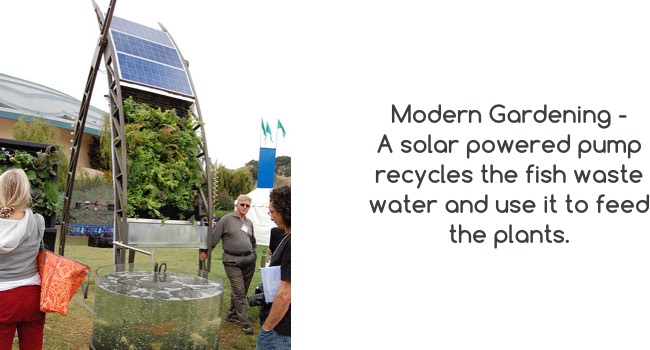
Solar pumps have two main advantages going for them: lower costs over the life of the pump and the ability to install the system anywhere, with no regard for electrical hookups.
As we already discussed, the advantages of a solar water pump make them perfect for remote locations where electricity isn’t available or by landowners that want long-term financial savings. That’s why many choose them for farming and livestock – they can be easily be installed on remote property away from buildings and power sources.
Solar pumps can also be used to provide water to a home that is off the electric grid entirely, such as a mountain getaway or cabin. It can be far cheaper and more convenient to obtain a solar pump that generates its own energy than to connect the house or cabin to the local water system. Similarly, swimming pool pumps and heaters powered by solar are also very cost effective.
Even the oil industry is jumping on the bandwagon. In an effort to reduce their diesel fuel use, Haliburton announced that it switched many of its pumps to solar pumps in 2013.
So while you probably won’t be able to move as much water with a solar pump as you could with one running on fossil fuels, they are still a great option. They’re cheap to operate, require little maintenance, and can be installed in very remote locations. Solar pumps have diverse applications and have become the way of the future due to their ability to generate renewable energy easily and inexpensively.
If you use a solar water pump, let us know in the comments!
Image Credits under CC License via Flickr – 1, 2, 3, 4, 5a, 5b, 5c, 6

